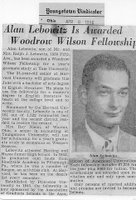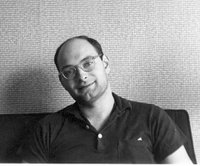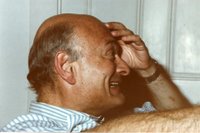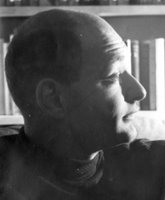Friday, June 09, 2006
Wednesday, May 31, 2006
from Marcie Hershman
- 1. Alan sitting at his desk in East Hall, office door open, window fully bright behind him. I walk past, slowing: "Hey, Alan!" He looks up, as if he always has a minute to spare, though clearly busy.
- 2. This would have been sometime in the mid-1980s, Alan comes to a meeting of part-time lecturers, some of us teaching English 5 and 6, the fiction and poetry workshops. Everyone knows that Alan was the professor on the full-time faculty instrumental in getting all of us "non-academics"--novelists, poets, fiction writers--on board at Tufts. He tells us that Harvard has begun paying its lecturers in the English Department a lordly $12K (or was it $14K?) a year. Impressed, I state that if Tufts were to increase its four-course pay to $12,000 a year, "I'd teach here for life." Alan shakes his head. "Don't say that. That's a deal you don't want to make."
- 3. Not long after that meeting, I accept a new post, a special "Preceptor" position at another college paying more than does Tufts, maybe even more than the Harvard lecturers get. Only one thing, the students in my classes are so obedient, bland, and by the book (and I'm not talking literary, here) that before Thanksgiving vacation, I phone Alan, asking if there at all might be any way that I could.... He cuts me right off. "Marcie, if you don't like it there," he says, "you just come home."
- How could I ever forget that phrase, "you just come home." That Alan made it happen, that he found a way to get me back to Tufts, where I have in fact found a kind of home, has meant a great deal to me, year after year.
- Even this past semester, when I know he's beeen on leave, I still slow down as I approach Alan's office in East Hall. Often, the door is open, but as I pass, the greeting is quieter now, and I don't say it aloud.
- Alan, hi! Enjoy all that's in front of you. And my deep thanks for all you've done to make me--and many other writers and teachers--be "at home."
- (Oh, one more thing: yes, we both came to Boston from Cleveland!)
- Enjoy--!
- with warmest wishes--
- Marcie
from Joe Litvak
Among the many pleasures of knowing Alan has been that of sharing in his love of good food, and particularly in his love of Parisian good food. It was Alan who pointed me in the direction of the wonderful old Left Bank bistro, Allard; his exquisite descriptions of meals there made me my own, once I finally managed to get over there, all the more delicious. It was also Alan who opened my eyes (and nose and taste buds) to the joys of A. J. Liebling, one of the great bon vivant (and therefore Parisophile) food writers of all time.
Alan is retiring, of course, and I’ll miss our vaguely conspiratorial remembrances, in the corridors of East Hall, of meals past. But I know that his bec fin will remain as entertainingly sharp as always, and I look forward to many more meals, and many more reminiscences of meals, with a friend whom I consider my comrade in gourmandise.
Alan, bon appetit!
Joe
Thursday, May 04, 2006
from Lee Edelman
 I lack the novelistic imagination required to capture my sense of Alan in a series of anecdotal recollections. To succeed in this genre would demand the talents I associate with Alan himself--talents that Alan spent so much time and energy cultivating in others. I continue to marvel at the patience, the generosity, the enthusiasm he brought to his discussions with students about the progress of their creative writing. Because Alan's office was opposite mine, and because we both used to work with our doors left open, I spent many hours preparing classes while overhearing Alan's conversation with an externally variable, but fundamentally unchanging, undergraduate attempting to describe a story that really wasn't quite "there." Being inclined by temperament to believe that taking seriously the undergraduate "creative" imagination would be a punishment more intolerable than Sartre's idea of hell, I never failed to wonder at Alan's capacity not only to listen to what seemed to me so much dreary banality, but also to elicit from it shape, originality, texture, the movement of thought. How much of that was Alan's skill at discovering the pearl in the oyster's drool and how much was the gift of handing over his own, and far more compelling, ideas, is something I'll never know. But I'll never forget how Alan brought together encouragement with rigor, support with a constant goading toward something more shapely, more particular, more distinct. Nor will I forget how those conversations were invariably punctuated by laughter. Alan's knack for putting his students at ease, for giving them the support they needed to take intellectual and emotional risks, made it possible for him to push them beyond what others might have seen as their limits.
I lack the novelistic imagination required to capture my sense of Alan in a series of anecdotal recollections. To succeed in this genre would demand the talents I associate with Alan himself--talents that Alan spent so much time and energy cultivating in others. I continue to marvel at the patience, the generosity, the enthusiasm he brought to his discussions with students about the progress of their creative writing. Because Alan's office was opposite mine, and because we both used to work with our doors left open, I spent many hours preparing classes while overhearing Alan's conversation with an externally variable, but fundamentally unchanging, undergraduate attempting to describe a story that really wasn't quite "there." Being inclined by temperament to believe that taking seriously the undergraduate "creative" imagination would be a punishment more intolerable than Sartre's idea of hell, I never failed to wonder at Alan's capacity not only to listen to what seemed to me so much dreary banality, but also to elicit from it shape, originality, texture, the movement of thought. How much of that was Alan's skill at discovering the pearl in the oyster's drool and how much was the gift of handing over his own, and far more compelling, ideas, is something I'll never know. But I'll never forget how Alan brought together encouragement with rigor, support with a constant goading toward something more shapely, more particular, more distinct. Nor will I forget how those conversations were invariably punctuated by laughter. Alan's knack for putting his students at ease, for giving them the support they needed to take intellectual and emotional risks, made it possible for him to push them beyond what others might have seen as their limits.That laughter, of course, was something I got to enjoy more directly as well. I fondly recall the many late afternoons when Alan and Linda and I would gather in one or another of our offices just to share our sense of the absurdity of some aspect of the academic life. Those conversations, which allowed for an abreaction to the vagaries of the institution itself, were important parts of the day for me, and they sealed a bond that remains one my fondest memories of life in East Hall.
Now that Alan is enjoying his life outside of East Hall, I have to confess that life within it seems seriously denuded. Not only do we miss his conversation, his wry sense of humor, his ironic perspective on the daily goings-on, but we also miss his wisdom in department meetings, his unfailing sense of perspective, and his embodiment of departmental continuity. Maybe, in part, we also miss having him there to be the "elder" statesman--a role that now seems, oddly and disconcertingly, to have fallen to us! But Alan filled the role so much better.
Fortunately, Alan's retirement from East Hall is really only nominal. He'll be back in the fall to teach again and that will allow us to prolong our sense that all is right with the world. In the meantime, though, we take comfort in the thought that he's finally free to read, write, and think without the distraction of papers to grade or meetings to attend or those damned letter of recommendation to write. And then, of course, there's the added comfort of knowing that we can always arrange to have dinner with him and Nan!
The English Department at Tufts is much diminished without Alan there. So I'm delighted to think, as this semester ends, that he'll be back again in the fall. And delighted as well that the summer ahead will give us a chance to get together and relax!
Wednesday, May 03, 2006
Lunch

I’ve known Alan since either ’65 or ’66 – it’s so far back I have trouble figuring it out. I came into his life as a student, progressed to a tutee, and somewhere along the line (it may have been at one of three thoroughbred racetracks at which we would hold our tutorial sessions) became a friend. In about ’71, I took a spiritual sabbatical that lasted over ten years, and we hooked up again. I moved back to Cambridge in ’88, and for the last eighteen years we’ve had a weekly lunch date.
We started at Frank Fox’s sandwich shop on Mass Ave. He had inexpensive but decent wine, but you couldn’t really call his Classico a sandwich. It was something more, a small piece of heaven. Eventually, things soured with Frank, and we moved on to the Casablanca and six or seven other joints. The French fries with the burgers went, and then with the advent of great antacid drugs, returned. Recently, we’ve been very happy at the B Side Lounge, where they have an excellent chicken club.
Over the course of these eighteen years, our friendship has mutated into something rare. Sure, we relate current news and tell stories, but mostly we just banter, enjoying the choice of the words that relate whatever might come to mind. And we laugh. You see, we have shared the thick and thin of two lifetimes. We have talked about all the friends, family, girl friends, wives, marriages, divorces, children, grandchildren, the books we’ve read, are reading, or have written, the countless presidential administrations, the wars, the illnesses, the deaths, the dreams, and the amazing strokes of good fortune. The extremes – the horrific and the comedic – have merged together into what sometimes appears to me as a numinous whiteness.
Now, one might naturally wonder if this fog is only a function of the fine spirits we consume at lunch. I think not, because, over the years, the unfortunate necessity of moderation has shown us its pinched face. Alas, we simply split a single bottle of red, yet – that slightly glowing aura still has us in its grasp. It’s wonderful. We’re very much our selves, but we are also each other. It is, I think, as close as I’m going to get to church or organized religion.
When I think about what Alan has given to the world, I’m humbled and amazed. He was an extraordinary teacher forty years ago, yet he has only gotten deeper into his understanding of the works he teaches. A river of humanity has been exposed to his fine mind and finer heart. I was lucky to have him. I am proud to be part of that river.
One of the qualities that Alan and I have shared, even as young men, is an appreciation for the uncertainties. At this point, looking at the future has become both laughable and, I confess, a bit spooky. My feeling is that if there are a few more lunches with Alan out there, I’m OK with whatever comes.
Oh, yes, and my love to you, as always.
Tono Hixon
Monday, May 01, 2006
from Adam Sachs
 I'd like to mention the voice. Ala -- sorry -- Professor Lebowitz (I could never get used to the first-name thing) would read us choice bits of Hemingway, Faulkner, Fitzgerald and after that it was impossible to hear those writers in any other voice. Much later I came across a recording of the real Hemingway talking and it was like listening to an Alvin and the Chipmunks record. Lebowitz stood at the front of the room and stretched the words thin: "Wouldn't it be pretty to think so?" My roommate Darin was in the class and we repeated this so relentlessly that another friend of ours took to mimicking it like an oppressed parrot. Sixteen years later the friend, never prompted, does a creditable Lebowitz-Hemingway.
I'd like to mention the voice. Ala -- sorry -- Professor Lebowitz (I could never get used to the first-name thing) would read us choice bits of Hemingway, Faulkner, Fitzgerald and after that it was impossible to hear those writers in any other voice. Much later I came across a recording of the real Hemingway talking and it was like listening to an Alvin and the Chipmunks record. Lebowitz stood at the front of the room and stretched the words thin: "Wouldn't it be pretty to think so?" My roommate Darin was in the class and we repeated this so relentlessly that another friend of ours took to mimicking it like an oppressed parrot. Sixteen years later the friend, never prompted, does a creditable Lebowitz-Hemingway.I don't -- not can't, just don't -- remember much about my Medford years but I do hear that voice clearly. I heard first when I'd cornered Lebowitz trying to talk my way off the waiting list for Hem-Faulk-Fitz. Sorry -- class full.
"But I spent my summer reading Absalom, Absalom!" I'd shouted. Shouted not because there's an exclamation in the title but because I was a crazed young person and because I really, truly wanted to take that class. Alan turned back and sized me up. He had what later I'd recognize as a grin but took then to be a sneer.
"Is that how you get your kicks?" the voice asked. I thought he might punch me. "OK, come by on Thursday and we'll see what we can do."
In the group therapy of the fiction writing workshops the voice was forgiving, precise, encouraging, easily amused. It helped talk us down from our self-invented ledges. I heard the voice again on my last official day as a student. I'd lined up, shaken hands with a stranger, accepted what I think was my diploma in a pleather pouch and was descending into the fields of nachas when I heard my name called again. It was Lebowitz, standing up in his own gown, crossing over to greet me at the bottom of the stairs and shake my hand -- probably the single nicest gesture of my academic career. So, Profess -- OK, Alan: Thanks for that and for the voice that guided so many of us through so many books and years. I think I thought at the time that the teaching of literature was about words and sentences; I understand now it is about people.
Adam Sachs ('92)
Saturday, April 29, 2006
from Phil Levine
 Alan was the chairman who hired me to teach at Tufts back in the early '80's. I've since taught poetry & poetry writing all over the country & had at least twenty bosses & none are near my heart the way Alan is, but I never thought of Alan as a boss. He was a friend & a fellow teacher. I never asked him for any help he didn't give, & in a thousand small ways he made me & my wife Franny feel totally at home at Tufts, a place it took a huge-hearted genius like Alan to make me feel at home at. I'd been teaching at Wind & Dust Tech (Fresno State), & my students were working class & pissed off, & I was working class & pissed off, but Alan made me feel comfortable. I have many warm memories of the man, the wonderful dinners he treated us to, the promises he made when he hired me & always kept, the interesting people he introduced me to--T.J. Anderson, in music, for example, who has become a friend for life. One memory in particular stands out. Jay Cantor, Linda Bamber, Alan, & I made up a committee to chose a a second poet to teach at Tufts. Jay & Alan had set their sights on a fine young male poet. I was with Linda: the poetry writing class were two-thirds women, they got me one semester, so--yes--let's get a woman poet for the other semester. Jay & Alan were solid in their choice. We sat there deadlocked for fifteen minutes or so, & then Linda said without the least drama that she believed that had she had the model of a woman fiction writer during her student years she might have followed her natural bent & become a novelist. She added, "I feel strongly about this." Ten seconds later Alan--who was the chair, the boss--said, "I hear you Linda; I'm changing my vote." That was about 1985; I'd been teaching since 1955 & in fact I'm still teaching, & it's the only example I can recall of a chairman actually listening to a teacher. A soulful, rational decision from achairman. Astounding. Enjoy your retirement, friend.
Alan was the chairman who hired me to teach at Tufts back in the early '80's. I've since taught poetry & poetry writing all over the country & had at least twenty bosses & none are near my heart the way Alan is, but I never thought of Alan as a boss. He was a friend & a fellow teacher. I never asked him for any help he didn't give, & in a thousand small ways he made me & my wife Franny feel totally at home at Tufts, a place it took a huge-hearted genius like Alan to make me feel at home at. I'd been teaching at Wind & Dust Tech (Fresno State), & my students were working class & pissed off, & I was working class & pissed off, but Alan made me feel comfortable. I have many warm memories of the man, the wonderful dinners he treated us to, the promises he made when he hired me & always kept, the interesting people he introduced me to--T.J. Anderson, in music, for example, who has become a friend for life. One memory in particular stands out. Jay Cantor, Linda Bamber, Alan, & I made up a committee to chose a a second poet to teach at Tufts. Jay & Alan had set their sights on a fine young male poet. I was with Linda: the poetry writing class were two-thirds women, they got me one semester, so--yes--let's get a woman poet for the other semester. Jay & Alan were solid in their choice. We sat there deadlocked for fifteen minutes or so, & then Linda said without the least drama that she believed that had she had the model of a woman fiction writer during her student years she might have followed her natural bent & become a novelist. She added, "I feel strongly about this." Ten seconds later Alan--who was the chair, the boss--said, "I hear you Linda; I'm changing my vote." That was about 1985; I'd been teaching since 1955 & in fact I'm still teaching, & it's the only example I can recall of a chairman actually listening to a teacher. A soulful, rational decision from achairman. Astounding. Enjoy your retirement, friend. Phil Levine
Friday, April 28, 2006
One in a Nation's Census

Hey, Alan, what’s it like to read all this? Your blog is a tribute to the remarkable friendships in your life, which must be several standard deviations from the norm in number and quality, anyway. I’m not surprised. I remember that you couldn’t even pop into Marcella’s for a sandwich without having an exchange with the owner, an exchange that probably meant as much as the ham and cheese.
My friendship with you is full of memories of food and wine, things you took such pleasure in and then that pleasure spilled over onto me. I would walk up the steps to your porch in Medford, knees turned to jelly I was so afraid I wouldn’t measure up to the honor of an invitation to dinner. It took a martini to put me at ease sufficiently so that I could talk to you. You were a fabulous cook—simple, terrific food. You not only cooked for me, but “recounted” food stories while you cooked. It was all good, the food as well as the narrative.
In your company I first heard Mabel Mercer, and watched Mr. Hulot’s Holiday, visited Marcella’s and much more. I took at least five classes with you during the couple of years I worked at Tufts as a secretary. In one class on Melville, you quoted the author writing that Ahab was “one in a nation’s census.” For me, that could as easily be applied to you as to the sea captain.
I can’t remember how many times I repeated the creative writing class with you back in the late seventies, early eighties. What I do remember is the way you approached our work, listening so carefully to each student writer, teaching us how to receive and critique writing without stomping on one another, and still managing to sort the dross from the gold. I recall clearly the way your face would light up when something really good came out. Those classes were magical.
At a dull time in my own life you were a light. You had a writer’s uncanny radar for all things I kept (or tried to keep) under the surface. I spun off from Tufts into marriage and family, career and all that, touching base with you less and less frequently. I regret that. You are a pivotal figure in my life, certainly the best teacher I ever had, but more than that.
Well, I gave it a shot but my tribute comes up short of all I wanted to say. It’s a poor starling at the window.
May the next years be as full of adventure and fun, food and wine, and good friends as all your other great years.
Barbara Keesey Simkowski
